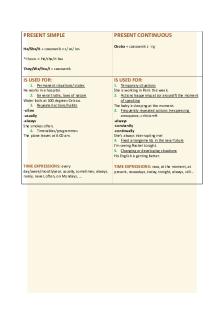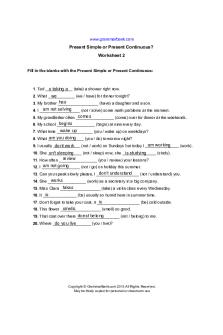Present simple vs present continuous (engilsh result) PDF

| Title | Present simple vs present continuous (engilsh result) |
|---|---|
| Author | Triple L Cruz |
| Course | English B.1.1 |
| Institution | Instituto Superior Tecnológico Babahoyo |
| Pages | 4 |
| File Size | 231.6 KB |
| File Type | |
| Total Downloads | 84 |
| Total Views | 213 |
Summary
Ejercicio de Presente simple y presente continuos......
Description
Present Simple vs. Present Continuous present simple •
present continuous
Verdades universales que no Actividades que están cambian con el tiempo ocurriendo en el momento Dogs bark. presente. (Los perros ladran) I am learning English. (Estoy aprendiendo Inglés.)
•
Situaciones habituales y Situaciones temporales (no hechos que se repiten con habituales). frecuencia. Every summer we go to I get up at 7. England, but this summer we (Me levanto a las 7.) are staying at home. (Todos los veranos vamos a quedamos en casa.)
•
Inglaterra, pero este verano nos
Va acompañado de los Va acompañado de adverbios de frecuencia. expresiones temporales She is always late. relacionadas con el (Ella siempre llega tarde.) presente, como now, today o at the moment.
Where are you living at the moment? (¿Dónde vives ahora?)
•
Con los verbos de No se usa este tiempo con los sentimiento o pensamiento. verbos de sentimiento o
I hate Mondays. (Odio los lunes.)
© Gonzalo Orozco 2011
pensamiento.
Ejercicio 1 Mira los dibujos y subraya la opción correcta.
1. 2.
Peter drives / is driving a taxi in London. He works / is working 12 hours a day.
3.
He isn’t working / doesn’t work now.
4. He is reading / reads a newspaper. 5. Kate is a teacher. She teaches / is teaching physics. 6. She isn’t teaching / doesn’t teach now. 7. She has / is having a coffee. 8. She learns / is learning Greek because
...
9. …she is going / goes to Greece every summer.
Ejercicio 2 Une preguntas y respuestas. 1. What do you do? 2. Are you at university?
a Mathematics. b Two other students.
3. What are you studying?
c No, they aren’t.
4. Do you live at home?
d I’m a student.
5. Where are you living?
e In a flat, near the university.
6. Who are you living with? 7. Are they studying Law1 too?
f Yes, we do – every night. g No, I don’t.
8. Do you go out a lot? h Yes, I am. 1 _d 2_h 3_a 4 _g 5 _e 6_b 7 _c 8_f
Ejercicio 3 Completa las siguientes mini-conversaciones con el present simple o el present continuous de los verbos entre paréntesis. 1. A: Where__are you going______ (you/go)? B: I _goes_ (go) to Mark’s house. 1
Derecho
© Gonzalo Orozco 2011
2. A: B: 3. A: B:
How __are you go__ (you/go) to school every day? I _walks_ (walk) to school. What _is Paul having_ (Paul/have)? He _has_ (have) some tea.
He _loves_ (love) tea.
4. A: What _do Amy do_ (Amy/do)? B: I _thinks_ (think) she’s an engineer but she _isn`t work_ (not work) right now.
Ejercicio 4 James está de vacaciones en Italia. Completa los huecos con la forma correcta del present simple o el present continuous de los verbos entre paréntesis. James (1) __works____ (work) in London, but he (2) _isn`t living_ (not live) there. Every morning he (3)_get up_ (get up) at 6.00 and he (4) _is going_ (go) by train to London. The journey (5) _takes_ (take) an hour and he (6) _isn`t getting_ (not get) home until 8.00 in the evening. Then he (7) _is watching_ (watch) TV and (8) _goes_ (go) to bed. He (9) _has_ (have) a good job, but he (10) _is working_ (work) very hard. He (11) _isn`t work_ (not work) now. He (12) _has_ (have) a holiday. He (13) _is staying_ (stay) in a hotel near the beach in Rimini. He (14) _meets_ (meet) a lot of interesting people. He (15) _is learning_ (learn) some Italian and he (16) _is eating_ (eat) a lot of good Italian food. James (17) _enjoys_ (enjoy) his job, but he (18) _enjoys_ (enjoy) his holiday so much that he (19) _isn`t want_ (not want) to go back to work next week.
Ejercicio 5 Traduce al inglés las siguientes oraciones. 1. Kylie se acuesta todos los días después de las 11. -Kylie goes to bed all days, late of the 11pm. 2. Me encanta tu vestido. -I loves your dress. 3. ¿Qué haces? Soy profesora. -what do you do? I`m teacher 4. ¿Qué haces? Los deberes. © Gonzalo Orozco 2011
- what do you do? The homeworks. 5. ¿En qué estás pensando? -what are you thinking?
© Gonzalo Orozco 2011...
Similar Free PDFs
Popular Institutions
- Tinajero National High School - Annex
- Politeknik Caltex Riau
- Yokohama City University
- SGT University
- University of Al-Qadisiyah
- Divine Word College of Vigan
- Techniek College Rotterdam
- Universidade de Santiago
- Universiti Teknologi MARA Cawangan Johor Kampus Pasir Gudang
- Poltekkes Kemenkes Yogyakarta
- Baguio City National High School
- Colegio san marcos
- preparatoria uno
- Centro de Bachillerato Tecnológico Industrial y de Servicios No. 107
- Dalian Maritime University
- Quang Trung Secondary School
- Colegio Tecnológico en Informática
- Corporación Regional de Educación Superior
- Grupo CEDVA
- Dar Al Uloom University
- Centro de Estudios Preuniversitarios de la Universidad Nacional de Ingeniería
- 上智大学
- Aakash International School, Nuna Majara
- San Felipe Neri Catholic School
- Kang Chiao International School - New Taipei City
- Misamis Occidental National High School
- Institución Educativa Escuela Normal Juan Ladrilleros
- Kolehiyo ng Pantukan
- Batanes State College
- Instituto Continental
- Sekolah Menengah Kejuruan Kesehatan Kaltara (Tarakan)
- Colegio de La Inmaculada Concepcion - Cebu















